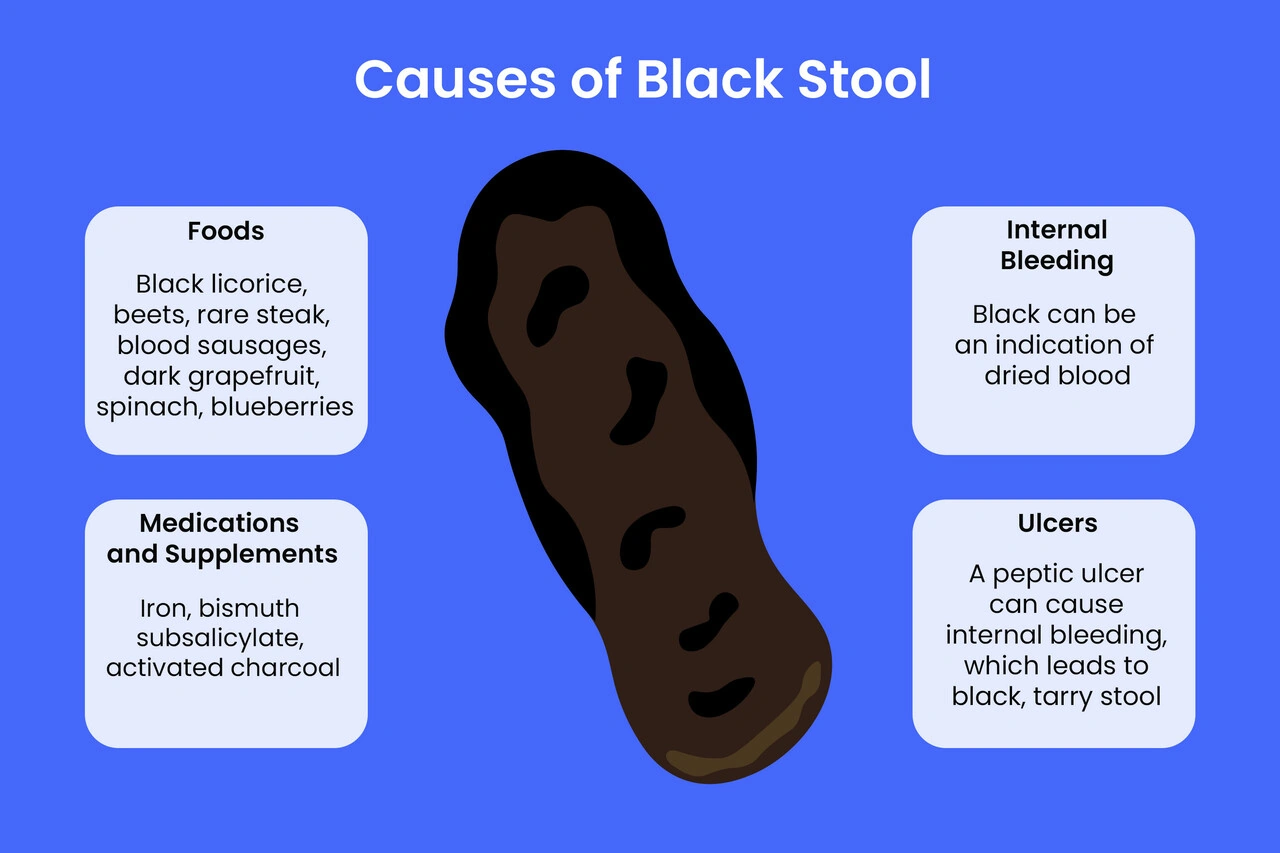:max_bytes(150000):strip_icc()/Health-Black-Poop-Stocksy-3304668_Horiz-00393f4397114ae18ceea99754fd395b.jpg)
Let’s Be Blunt
Okay, let’s just get this out of the way: everyone poops. (Yes, you. Me too.) And sometimes? What you see in the toilet bowl will totally surprise you. Have you ever stood up, glanced down… and thought, whoa, why is my poop suddenly black? Before your mind jumps to every worst-case scenario Google can spit out, let’s have an actual, human conversation about this.
I’ve been there. That “oh no, is this serious?” wave. The awkward urge to text a friend but… no way, too weird. But seriously: you’re not alone. The truth is, black stool has a few possible causes—and most aren’t as terrifying as your imagination wants you to believe. So, when should you worry about black stool? Grab a cup of tea, let’s walk through this together.
Weird Colors Happen
Could Your Snack Be the Culprit?
First things first. Go back in your mind to yesterday. Did you eat a mountain of blueberries? Maybe some black licorice at the movies? Or… confession time: blood sausage at that holiday party? Even dark chocolate cookies can do it (according to Healthline, it’s surprisingly common).
These foods are basically “natural dye bombs” for your gut. Toss in iron supplements or bismuth (the stuff in Pepto-Bismol)… and you can definitely find yourself surprised by black poop the next day. Fun party trick? Not so much, but at least it’s harmless. The good news? When your food is the cause, the color vanishes after a few days, especially if you cut back on the dark stuff.
Real Life Oops
A friend texted me, almost in panic, after a long weekend bingeing on licorice allsorts (don’t judge; it was stress)—she thought she was dying. It cleared up fast once she took a licorice break… and now it’s a running joke between us. We call it “the licorice incident.”
Supplements and Meds—Yep, They Can Trick You
Iron tablets are infamous for making poop look black (this Medical News Today piece is super clear about it), and same goes for those pink bismuth stomach meds. So if you’ve just started an iron supplement and your stool goes black, don’t panic just yet. But if things stay that way, or you’re feeling weird, there’s more to consider. Sometimes, it’s literally just your meds—boring answer, but true!
Pro tip:
Keep a mental list of anything new—snacks, supplements, cocktails of cold medicine. It helps you connect the dots next time your toilet bowl throws a curveball.
A New Shade of Scary?
When It’s NOT Your Diet (and Should You Google It?)
Right. So you haven’t eaten a bag of licorice and you haven’t touched an iron pill in months. And there it is… black, tarry, and oh, the smell—it’s kind of metallic, a bit like old coins. (Sorry if that’s TMI, but it helps to know what you’re sniffing for!)
This is when your worry-meter can turn up just a notch (but don’t spiral, stay with me). Here’s where “melena” comes in—a fancy word for black, tarry stool caused by bleeding higher up in your digestive tract. Your stomach, maybe your esophagus or the first bit of your small intestine. Blood from up there gets digested and turns your poop into that classic tar look. Sticky, shiny, foul-smelling… it’s a thing, I promise (according to the Cleveland Clinic’s guide).
Anecdote: The Spicy Regret
My cousin once called me after a spicy curry night followed by a morning surprise. Spoiler: he thought he’d ruptured something. Turns out, the culprit was black pudding (yes, that’s a thing), not anything sinister. But he did get checked out—just in case.
Harmless or Not? Here’s a Cheat Sheet
| Type | Common Causes | Texture/Odor | How Long It Lasts |
|---|---|---|---|
| Harmless Black Stool | Food (blueberries, licorice), iron pills, Pepto-Bismol | Normal, not tarry, usual odor | 1–3 days after stopping food/med |
| Worrisome Black Stool (Melena) | Bleeding ulcers, gastritis, upper GI problems | Tarry, sticky, metallic/rotten smell | Persists, may worsen, see a doc |
If you land in the second column… read on. This is where the “when should you worry about black stool” question really matters.
Why Would There Be Blood?
Hang with me as we get a little science-y (in the least painful way possible, promise). If you’ve got bleeding high up in your digestive tract—think ulcers, inflammation, or even a tear from violent vomiting (hello, food poisoning nightmares)—that blood gets digested. It turns jet black by the time it comes out the other end. Not fun, not normal. Sometimes, liver issues can cause swollen veins (called varices) in your esophagus or stomach, and those can bleed too (according to this medical overview).
Cancer isn’t common, but yeah… it’s on the list. That’s why you don’t want to just brush it off if that black stool keeps coming back or shows up with new sidekicks like pain or dizziness.
What’s Going On With Your Body?
Symptoms That Should Poke You to Call a Doc
So, how do you know if it’s “just a snack” or something bigger? The answer: look for other signals. Your gut isn’t subtle. Here’s what to watch for:
- Feeling lightheaded, dizzy, or faint when you stand
- Ongoing stomach or upper belly pain
- Unexplained tiredness or weakness
- Noticeable weight loss for no good reason
- Vomiting—especially if there’s blood
- Black stools lasting more than a few days
If this list is you… don’t wait, just check in with a healthcare person. No shame. No “it’ll just go away.” Your health is more important than a quick Google. Trust me… I had a friend who ignored these signs for weeks and ended up in the ER for a bleeding ulcer (all good now, but lesson learned).
Want more on what can go wrong? Here’s a deep dive into black stool: causes death—it lays out the scary scenarios, but also reassurance for when it’s not so scary.
But What If There’s No Blood You Can See?
This messes with a lot of people: sometimes the stool is black, but there’s no visible blood anywhere else (not in the bowl, not on the paper). Weird? A little—but it happens. Sometimes, the blood is so digested it’s totally invisible without a special test. So don’t rule out trouble just because there’s no red in sight. (Want more detail? This explainer on Black stool without blood is super helpful for the “is it serious, or isn’t it?” crowd.)
Meds, Snacks, or Something More?
When Should You Actually Start Worrying?
All right—let’s answer the real reason you’re here: when should you worry about black stool? Here’s my “kitchen-table” test: If you’ve just gorged on dark foods or changed medicine and feel totally fine, wait a couple days. If things don’t “normalize,” or if you notice any of those red-flag symptoms above… it’s time for a call or a visit. (Don’t overthink it. Waiting a couple of days won’t hurt if you have no other symptoms. But don’t convince yourself out of seeking help, either!)
For a checklist of what’s not an emergency, check out this post on Black stool without blood—honestly, it’s great for peace of mind and understanding when you can just watch and wait.
Okay, You’re Concerned… Now What?
What Happens at the Doctor’s?
Don’t be scared. Most of what a doc does to check for bleeding is painless and quick. They’ll probably ask about what you’ve been eating, any new meds, and how long this has been going on. If they think it’s GI bleeding, they might do a stool test (to see if there’s hidden blood), maybe some bloodwork, or even an endoscopy (a tiny camera that looks around your upper digestive tract—the stuff of medical TV shows, but really not a big deal most of the time).
Catch things early? Most GI bleeding is very treatable. The big risk is letting it go because you’re hoping it’s licorice… when it’s an ulcer shouting for attention.
TMI Alert: My Family’s Rule
My grandma always had this rule: “If something looks weird coming out, check what you put in. If it still looks weird after a few days, call someone who gets paid to worry for you.” Can’t argue with grandma logic. She wasn’t wrong.
No Need to Panic, But Don’t Ignore It
Your Peace of Mind (And Gut) Matters
Look, let’s wrap this up as friends. Nobody wants to obsess about poop, but knowing the difference between “just weird” and “maybe bad” can save a ton of stress. Most of the time? Black stool is food, supplements, or meds. That’s the good news. But—and this is important—if it keeps coming, brings a few other not-so-cool buddies (pain, tired, dizzy), or you just can’t shake that bad feeling… that’s when you should stop guessing and get checked.
For the truly curious or worried: get the details on black stool: causes death, or scroll through the more reassuring Black stool without blood FAQ for the “just curious” crew.
The grown-up thing to do? Trust your gut—literally. If it’s off, don’t put it off. One quick check could mean the difference between a simple fix and something more complicated. And hey, if it’s just a blueberry hangover… well, at least you’ll have a weird conversation starter at your next brunch. Stay curious, don’t stress alone, and talk about the weird stuff with people you trust. Odds are, they’ve been there too.


















Leave a Reply
You must be logged in to post a comment.